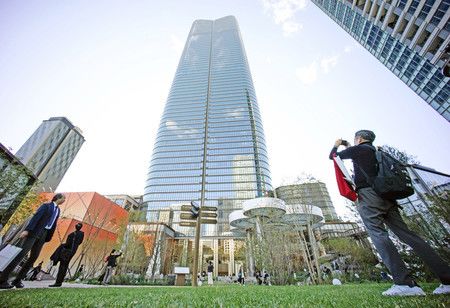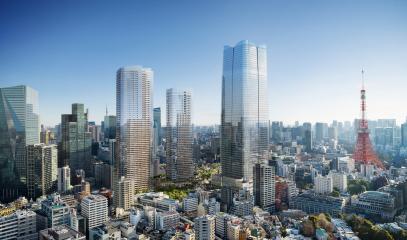Height and sustainability record for Tokyo's new Azabudai skyscraper
While offices in many of the world's major cities struggle to find workers to occupy them, Tokyo bucks the trend and opens Japan's tallest new tower on Friday: offices, flats and an 'urban village' that is vertical but also green with 2.4 hectares, about 30% of the total area, reserved for green space
Tokyo (AsiaNews) - With a height of 330 metres, the tallest skyscraper in Japan has risen this week in the heart of Tokyo: it is the Azabudai Hills Mori JP Tower, which exceeds the previous "record" holder, the Abeno Harukas of Osaka, by 30 metres.
The building is only slightly lower than Tokyo Tower, the symbolic tower of the capital which stands at 333 metres. The complex was designed by Pelli Clarke Pelli Architects and developed by Mori Building Company, estimated to have cost 580 billion yen (.4 billion). Construction began in 2019.
The Azabudai Hills complex (麻布台ヒルズ), formerly known as the Toranomon-Azabudai district, is located in the Toranomon business area, in the Minato district and the tower, whose official opening is scheduled for Friday, will play a crucial role because in the scope of its design has made it possible to redevelop the neighborhood still dotted with small wooden houses that are very vulnerable to natural disasters, such as earthquakes.
The complex created is multifunctional: in addition to offices and apartments, there is a medical institute managed by Keio University, a luxury hotel by Aman Resorts, restaurants, shops and the British School of Tokyo. A true vertical "urban village", but which also tries to look at sustainability with 2.4 hectares of surrounding parkland: approximately 30% of the total surface area has in fact been reserved for green space.
“We studied modern cities globally and brought the best model to one place,” said Junya Yamamoto, an official at the Mori Building. The skyscraper contains a specially designed co-working space and café to allow employees of the tenant companies to socialize outside the confines of their organisations, and when fully operational it is expected that around 20,000 people will work in the complex, while 3,500 people will live in the approximately 1,400 apartments there . The total area of the complex is 861,700 square meters, larger than Roppongi Hills, a huge landmark built by the developer in the neighboring Roppongi district.
The Japanese project goes against the trend of what is happenening in cities around the world, where offices struggle to find workers to occupy them. The remote working trend, triggered by the pandemic, is costing Manhattan " billion a year" and "depopulating London", reports say. In Tokyo, the world's largest metropolis, however, not only have employees returned, but companies are doubling their offices. In 2023, Tokyo will add approximately 1.26 million square meters of new space
11/08/2017 20:05








.png)










